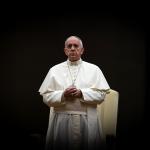This interesting Q&A popped up yesterday over at Crux, with a question answered by the Rev. Kenneth Doyle via CNS:
Q. At Mass recently, I was stunned by a statement made by the deacon who was giving the homily. That has made me wonder whether deacons have sole independence when preparing remarks, or if the priest exercises oversight. (City of origin withheld)
A. On the parish level, the pastor has the ultimate responsibility for the orthodoxy and propriety of what is said from the pulpit. To answer your question directly: A deacon does not have “sole independence” for his remarks.
In practice, though, rarely does this result in the pastor’s “pre-screening” a deacon’s homilies. By the very fact that he has allowed and invited the deacon to preach, the pastor has indicated his confidence that the deacon will handle things maturely and well. Deacons do not pop up suddenly from a congregation on a Sunday morning.
Before being ordained, deacons undergo a fairly intensive “vetting” process that includes several years of theological education, psychological evaluation, and tutoring in pastoral techniques.
Returning to your question, you would be best advised to bring your concern to your pastor. If he, like you, is “stunned” by what the deacon is said to have said, he will surely bring it to the deacon’s attention to avoid future problems. If he deems it necessary, the pastor might even see fit to make a correction from the pulpit.
My first reaction to this? I have to wonder if the reader above has ever had the same concerns, or expressed the same question, about a priest. I’d also be curious to know what, exactly, the deacon said that left the reader “stunned.”
As Father Doyle noted, deacons generally receive extensive training in the art and craft of preaching. In my diocese, we had three semesters of homiletics before we were ordained. Some dioceses require additional training after ordination before the bishop will allow the deacons to preach. (I can think of a few priests for whom that should have been a requirement, but I digress…) And I know of some pastors who don’t like deacons to preach on principle—they feel it should be the job of the celebrant—and others who are dissatisfied with the quality of diaconal preaching and insist that their deacons confine their homilies to baptisms and wake services.
When or whether a deacon gives a homily is at the discretion of the pastor.
But, sometimes they’ll throw you a curve ball. It’s not unheard of for a priest to whisper to the deacon, as they’re about to process down the aisle at the start of Mass, “Oh, by the way, you’re preaching. Good luck.” And it’s not uncommon for a priest to ask me in the sacristy before Mass, “Feel like saying a few words?” (The Boy Scout motto applies: be prepared.)
Beyond that: I’ve never had a priest or pastor vet my homilies, and no one has ever told me what to say or how to say it from the pulpit. The celebrants generally trust that I’ll have something adequate to say and won’t use by seven or eight minutes to promote the sainthood cause of Vlad the Impaler or suggest that we revisit lingering questions about Area 51. The biggest criticism I’ve heard from clergy? They don’t like that I preach from a text. However, that’s never been an issue with people in the pews (or if it is, no one has complained about it.)
Once in a while, someone in the pews will complain about something I’ve said. Just a few weeks ago, a parishioner wrote to tell me she found this homily for the Solemnity of Christ the King “too political.” And last spring, another parishioner pulled me aside after Mass to let me know she got up and walked out of my homily when I mentioned, in passing, Bob Schieffer, whom she described as “a pro-abortion shill for Obama.”
You can’t please everyone.
But to answer the original question above: as ordained members of clergy, deacons are expected to be able to preach competently and coherently, and to preach within the bounds of accepted Church teaching. Like priests, we make a promise of obedience to our bishop and we also swear an oath of fidelity to the Magesterium. If someone is seriously concerned that a deacon (or priest) has preached something that is false, inaccurate or in direct opposition to the teachings of the Church, that person should let the preacher know, and also alert the pastor. There is a chance the preacher erred or misspoke.
Of course, there’s also a chance the person in the pews was mistaken, too.












